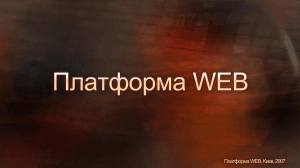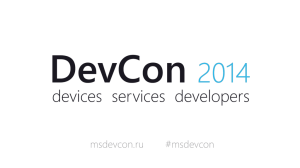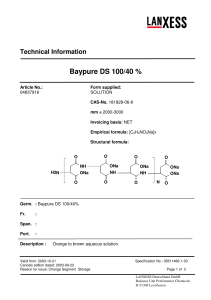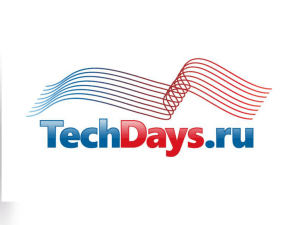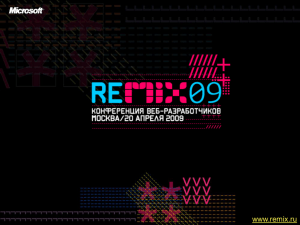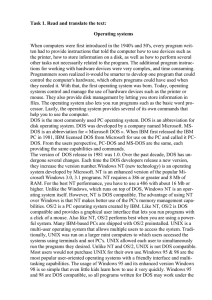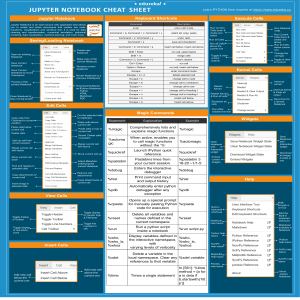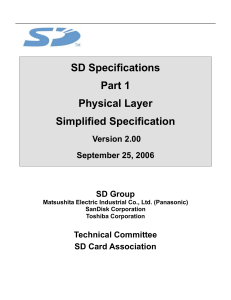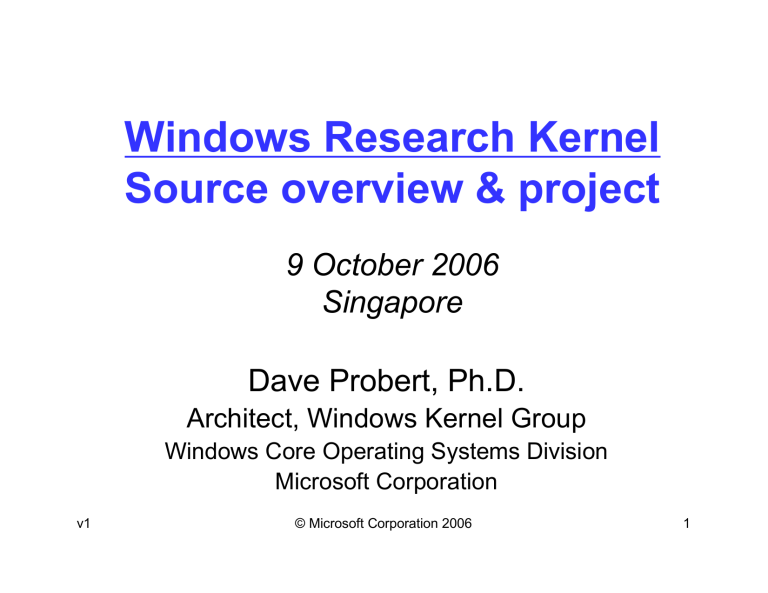
Windows Research Kernel
Source overview & project
9 October 2006
Singapore
Dave Probert, Ph.D.
Architect, Windows Kernel Group
Windows Core Operating Systems Division
Microsoft Corporation
v1
© Microsoft Corporation 2006
1
Windows Research Kernel (WRK):
Goals
• Make it easier for faculty and students to compare
and contrast Windows to other operating systems
• Enable students to study source, and modify and build
projects
• Provide better support for research & publications
based on Windows internals
• Encourage more OS textbook and university-oriented
internals books on Windows kernel
• Simplify licensing
v1
© Microsoft Corporation 2006
2
UNIX/NT starting-points
UNIX (early 1970s)
NT (late 1980s)
target hardware
environment
16-bit, Kbytes, uniproc, 32-bit, Mbytes, multiproc,
swapping
virtual memory
style, influences
rich kernel, multics
rich kernel, VMS, multics/unix
namespace root
file system
object manager
app refs on kernel
structures
file descriptors, pids, unified handle mechanisms,
object mgmt, naming, refs
IPC numbers, /proc
devices
file system
object manager
processes
integrated: fork/exec
assembled as components
synchronization
select, special APIs
integrated with handles
memory mgmt
segment/object based
separation of mapping/object
I/O model
synchronous, vtable
asynchronous, layered
v1
© Microsoft Corporation 2006
3
NTOS Kernel Sources
Based on Windows Server 2003 SP1 and Windows x64 NTOS
• Processes, threads, LPC, VM, scheduler, object manager, I/O manager,
synchronization, worker threads, kernel memory manager, …
• most everything in NTOS except plug-and-play,
power-management, and specialized code such as
the driver verifier, splash screen, branding, timebomb, etc.
• non-kernel (drivers, file systems, networking) code is from
the DDK and IFSKIT
• Simplified in a few places, cleaned up comments, improved spelling
• Non-source is encapsulated in a binary library
• Build and set up utilities and tools
• Tools for tracing, performance monitoring, logging, debugging, etc
• Packaged with
• WDK subset and documentation for working with drivers
• VirtualPC environment
• Kernel regression tests
• Original specs & design docs for NT, CRK w/ source references
• Over 800K lines of kernel source
v1
© Microsoft Corporation 2006
4
WRK licensing
Improvements over current MSR UR license:
• Students can use in classroom environment
License type:
• Non commercial, academic use only; allow derivative works for
non-commercial purpose
Eligibility criteria:
• Available to faculty and students in colleges/universities
Usage scenarios:
• View, copy, reproduce, distribute within the institution
• Modify for teaching and experimentation purposes
• Produce teaching and research publications including
relevant snippets of source
• Can use in textbooks and academic publications,
and community forums
• Have to perpetuate MS copyright notices
• Share derivatives within academic community
v1
© Microsoft Corporation 2006
5
NT Kernel Design Workbook
NT OS/2 Design Workbook: Core OS
File
Title
Author(s)
dwintro
NT OS/2 Design Workbook Introduction
Lou Perazzoli
ke
NT OS/2 Kernel Specification
David N. Cutler,
Bryan M. Willman
alerts
NT OS/2 Alerts Design Note
David N. Cutler
apc
NT OS/2 APC Design Note
David N. Cutler
ob
NT OS/2 Object Management Specification
Steven R. Wood
proc
NT OS/2 Process Structure
Mark Lucovsky
suspend
NT OS/2 Suspend/Resume Design Note
David N. Cutler
attproc
NT OS/2 Attach Process Design Note
David N. Cutler
vm
NT OS/2 Virtual Memory Specification
Lou Perazzoli
vmdesign
NT OS/2 Memory Management Design Note
Lou Perazzoli
io
NT OS/2 I/O System Specification
Darryl E. Havens
irp
NT OS/2 IRP Language Definition
Gary D. Kimura
namepipe
NT OS/2 Named Pipe Specification
David Cutler & Gary
Kimura
mailslot
NT OS/2 Mailslot Specification
Manny Weiser
rsm
Windows NT Session Management and Control
Mark Lucovsky
fsdesign
NT OS/2 File System Design Note
Gary D. Kimura
fsrtl
NT OS/2 File System Support Routines Specification
Gary D. Kimura
v1
© Microsoft Corporation 2006
6
NT Kernel Design Workbook
NT OS/2 Design Workbook: Core OS
File
Title
Author(s)
sem
NT OS/2 Event - Semaphore Specification
Lou Perazzoli
argument
NT OS/2 Argument Validation Specification
David N. Cutler
timer
NT OS/2 Timer Specification
David N. Cutler
coding
NT OS/2 Coding Conventions
Mark Lucovsky,
Helen Custer
ulibcode
NT Utilities Coding Conventions
David J. Gilman
exceptn
NT OS/2 Exception Handling Specification
David N. Cutler
os2
OS/2 Emulation Subsystem Specification
Steven R. Wood
status
NT OS/2 Status Code Specification
Darryl E. Havens
ntdesrtl
NT OS/2 Subsystem Design Rational
Mark H. Lucovsky
resource
NT OS/2 Shared Resource Specification
Gary D. Kimura
execsupp
NT OS/2 Executive Support Routines Specification
David Treadwell
support
NT OS/2 Interlocked Support Routines Specification
David N. Cutler
dd
Windows NT Driver Model Specification
Darryl E. Havens
oplock
NT OS/2 Opportunistic Locking Design Note
Darryl Havens, et al
memio
NT OS/2 Memory Management Guide for I/O
Lou Perazzoli
time
NT OS/2 Time Conversion Specification
Gary D. Kimura
mutant
NT OS/2 Mutant Specification
David N. Cutler
v1
© Microsoft Corporation 2006
7
NT Kernel Design Workbook
NT OS/2 Design Workbook: Core OS
File
Title
Author(s)
prefix
NT OS/2 Prefix Table Specification
Gary D. Kimura
startup
NT OS/2 System Startup Design Note
Mark Lucovsky
dbg
NT OS/2 Debug Architecture
Mark Lucovsky
coff
NT OS/2 Linker/Librarian/Image Format Spec
Michael J. O'Leary
cache
NT OS/2 Caching Design Note
Tom Miller
ntutil
NT OS/2 Utility Design Specification
Steven D. Rowe
implan
NT OS/2 Product Description and Implementation Plan
David N. Cutler
basecont
NT OS Base Product Contents
Lou Perazzoli
v1
© Microsoft Corporation 2006
8
The WRK sources
v1
© Microsoft Corporation 2006
9
%WRK%\base\ntos
v1
© Microsoft Corporation 2006
10
Object Manager lookups
ObpLookupObjectName(Name,Context)
– Search a directory for specified object name
– Use ObpLookupDirectoryEntry() on Directories
– Otherwise call object-specific ParseProcedure
• Implements symbolic links (SymbolicLink type)
• Implements file systems (DeviceObject type)
v1
© Microsoft Corporation 2006
11
IopParseDevice
(DeviceObject, Context, RemainingName)
–
–
–
–
–
–
–
–
–
–
v1
Call SeAccessCheck()
If (!*RemainingName) directDeviceOpen = TRUE
For file opens, get Volume from DeviceObject
Update references on Volume and DeviceObject
Construct an I/O Request Packet (IRP)
FileObject = ObCreateObject(IoFileObjectType)
Initialize FileObject
Initiate I/O via IoCallDriver(VolumeDevice, IRP)
Wait for I/O to signal FileObject->Event
Return the FileObject to caller
© Microsoft Corporation 2006
12
ntos\ob\
ntos\io\iomgr\
v1
© Microsoft Corporation 2006
13
Setup CMD Variables
WRK Lab
0a. set wap=
D:\WAP
0b. set sing=
%wap%\SingaporeWorkshop-October2006
0c. set wapcd=
%sing%\WAP-July2006
0d. set adds=
%sing%\WAP-Additions-October2006
0e. set cdwrk=
%wapcd%\WindowsResearchKernel-WRK
0f. set cdspec=
%cdwrk%\NTDesignWorkbook
0g. set cdsrc=
%cdwrk%\WRK-v1.2
0h. set WRK=
%wap%\WRK
0i. set dbgpipe=
\\.\pipe\debug
0j. set targetmachine= SingaporeWRKxx
0k. set windbgargs= -k com:pipe,port=%dbgpipe%,resets=0,reconnect
0l. set arch=
x86
0m. set hals=
%cdsrc%\WS03SP1HALS\%arch%
0n. set dbg=
%wap%\Debuggers
0o. set wrkexe=
%WRK%\base\ntos\BUILD\EXE
0p. set _NT_SYMBOL_PATH= %WRKEXE%
0q. set cdcrk=
%wapcd%\CurriculumResourceKit-CRK
0r.
path %dbg%;%wrk%\tools\%arch%;%path%
<Open CMD window, RUN D:\WAP\setvars.bat XX where XX= ??>
WRK Lab
Installing VirtualPC and Windows Server 2003
1.
2.
3.
4.
5.
6.
7.
8.
Copied CD onto %wap%
Installed VirtualPC from: %cdwrk%\VirtualPC2004SP1\FullInstall
Inserted Windows Server 2003 SP1 disk into CD drive (or use ISO)
Ran VirtualPC and created virtual machine and hard disk for WS03
in %wap%\VirtualMachines (name machine %targetmachine%)
Booted from the Windows Server 2003 CD
Set COM1: %debugpipe% in VPC, resized screen to 800x600
Installed the VM additions, rebooted VPC
Installed debugger (at %dbg%):
cd /D ”%cdcrk%\CRKTools\Debugging Tools”
dbg_x86_6.6.03.5.exe
v1
© Microsoft Corporation 2006
15
WRK Lab
Setup Windbg Debugger
8a. Open debugger help:
8b. Start debugger:
%dbg%\Debugger.chm
windbg %windbgargs%
<won’t break-in until VirtualPC kernel booted with /DEBUG switch>
Setup VirtualPC shared folder
8c. In VPC Settings:
Add Shared Folder: W: %WRKEXE%
Click box to save across reboots
v1
© Microsoft Corporation 2006
16
WRK Lab
Building the WRK kernel
9a.
9b.
9c.
9d.
9e.
xcopy /crehkdq %cdsrc% %WRK%\
xcopy %hals%\halacpim\*.dll %WRKEXE%\
xcopy %adds%\*.dll %WRK%\tools\x86\
cd %WRK%\base\ntos
nmake -nologo %arch%=
Will produce kernel files in %WRKEXE%\wrkx86.*
NOTE: see instructions in %cdwrk%\README.txt
v1
© Microsoft Corporation 2006
17
WRK Lab
Testing the WRK kernel
In CMD window on VPC:
10a. xcopy W:wrkx86.exe C:\Windows\System32\
10b. xcopy W:halacpim.dll C:\Windows\System32\
halacpim.dll is VirtualPC-compatible MP hal
because wrkx86 is built Multi-Processor not Uni-Processor
10c. notepad C:\boot.ini [may need to: attrib –r –h C:\boot.ini]
add: multi(0)disk(0)rdisk(0)partition(1)\WINDOWS="test“
/kernel=wrkx86.exe /hal=halacpim.dll /debug /debugport=com1
10d. Reboot %targetmachine% and specify ‘test’ kernel from menu
10e. Break in with debugger, version will be 3800 MP
v1
© Microsoft Corporation 2006
18
WRK Lab
Fair-share scheduling
<approach suggested by Marty Humphrey at University of Virginia>
Adjust Quantum length based on how many threads are in the process
Kernel changes:
base\ntos\inc\ps.h – use bits in ETHREAD for ‘scheduling bucket’
base\ntos\ke\ki.h – mod KxQueueReadyThread & KiSelectReadyThread
& KiFindReadyThread
base\ntos\ke\thredsup.c – mod KiDeferredReadyThread
base\ntos\ke\balmgr.c – for completeness
base\ntos\ps\psquery.c – change to NtSetInformationThread to join a
scheduling bucket
public\sdk\inc\ntpsapi.h – new definition for NtSetInformationThread
v1
© Microsoft Corporation 2006
19
WRK Lab
Fair-share scheduling - algorithm
x = original quantum (from Thread->QuantumReset or just
Thread->Quantum)
N = number of groups (i.e. on the ready queue)
n[i] = number of threads on the ready queue in group i
M = sum(i=1,N) N[i] => total number of threads in groups and
on the ready queue
y[i] = new quantum for queued threads in group I = (M * x /
n[i]) / N
note: sum(i=1,N) y[i] = M * x and: if N == M == n[i] == 1, then y[i] == x
and if N = k then M = N * k and so n[i] = M / N implies y[i] = (N/M) * (1/N) * M = x
v1
© Microsoft Corporation 2006
20
WRK Lab
Fair-share scheduling - algorithm
if a thread from bucket i gets queued
if (n[i]++ == 0) N++
M++
if a thread from bucket i gets dequeued
if (--n[i] == 0) N-M-Implementation note: only put a thread into a bucket from
within the thread itself since if it is on the ready queue
our bookkeeping will be wrong
v1
© Microsoft Corporation 2006
21
WRK Lab
Fair-share scheduling – code changes
// Scheduling Bucket globals
struct {
ULONG ReadyGroups;
ULONG ReadyThreads;
ULONG Buckets[MAXIMUM_SCHEDULE_BUCKETS];
} BucketScheduling;
// N
// M
// n[i]
if (eThread->BucketsEnabled) {
BucketScheduling.ReadyThreads++;
if (BucketScheduling.Buckets
[eThread->ScheduleBucket]++ == 0)
BucketScheduling.ReadyGroups++;
}
v1
© Microsoft Corporation 2006
22
WRK Lab
Fair-share scheduling – code changes
// Adjust quantum if in a scheduling bucket
eThread = CONTAINING_RECORD(Thread, ETHREAD, Tcb);
if (eThread->BucketsEnabled) {
ULONG bucket = eThread->ScheduleBucket;
ULONG newquantum;
newquantum = Thread->QuantumReset *
BucketScheduling.ReadyThreads /
(BucketScheduling.ReadyGroups *
BucketScheduling.Buckets[bucket]);
if (newquantum > 127)
newquantum = 127;
else if (newquantum < THREAD_QUANTUM)
newquantum = THREAD_QUANTUM;
v1
© Microsoft Corporation 2006
23
WRK Lab
Fair-share scheduling – code changes
Thread->Quantum = (SCHAR)newquantum;
BucketScheduling.ReadyThreads--;
if (--BucketScheduling.Buckets[bucket] == 0)
BucketScheduling.ReadyGroups--;
}
v1
© Microsoft Corporation 2006
24
WRK Lab
Project: modify scheduler algorithm
Fair-share scheduling
<install project files>
copy WRKProject\usermode\exei386\*.exe V:\FairShare\
Logon to VirtualPC, cd to C:\FairShare and run:
spawnthreads -t 100 4 8 16 32
process nthreads cpu
%
normal
fair
-------------------------------------------------0
4
6.74
6.87%
6.67%
25.00%
1
8
13.53 13.79% 13.33%
25.00%
2
16
26.08 26.58% 26.67%
25.00%
3
32
51.78 52.77% 53.33%
25.00%
==================================================
60
98.13 100.00%
v1
© Microsoft Corporation 2006
25
WRK Lab
Fair-share scheduling – result
spawnthreads -s -t 100 4 8 16 32
process nthreads cpu
%
normal
fair
-------------------------------------------------0
4
28.87 29.05%
6.67%
25.00%
1
8
19.27 19.39% 13.33%
25.00%
2
16
17.61 17.72% 26.67%
25.00%
3
32
33.63 33.84% 53.33%
25.00%
==================================================
60
99.38 100.00%
v1
© Microsoft Corporation 2006
26
WRK Lab
Fair-share scheduling – result
spawnthreads [-s] -t 100 4 8 16 32
process nthreads
%
[-s]%
normal
fair
-------------------------------------------------0
4
6.87 29.05%
6.67%
25.00%
1
8
13.79 19.39% 13.33%
25.00%
2
16
26.58 17.72% 26.67%
25.00%
3
32
52.77 33.84% 53.33%
25.00%
==================================================
60
Exercise for the class: Why not more exact?
v1
© Microsoft Corporation 2006
27
spawnthreads -t 100 4 8 16 32 128 256 512 99 113 270 4 8 32 8 4 99 270
process nthreads
%
% [-s] normal
fair
-------------------------------------------------0
4
1.03
5.16%
0.21%
5.88%
1
8
1.96
4.86%
0.43%
5.88%
2
16
3.62
4.61%
0.86%
5.88%
3
32
6.66
5.17%
1.72%
5.88%
4
128
9.36
6.35%
6.87%
5.88%
5
256
9.77
6.85% 13.74%
5.88%
6
512
9.11
7.15% 27.48%
5.88%
7
99
8.82
6.72%
5.31%
5.88%
8
113
9.08
6.83%
6.07%
5.88%
9
270
10.75
7.10% 14.49%
5.88%
10
4
0.97
6.83%
0.21%
5.88%
1.83
4.94%
0.43%
5.88%
11
8
12
32
5.87
4.57%
1.72%
5.88%
13
8
1.81
4.97%
0.43%
5.88%
14
4
0.98
5.70%
0.21%
5.88%
15
99
9.75
6.04%
5.31%
5.88%
16
270
8.63
6.15% 14.49%
5.88%
==================================================
1863
v1
© Microsoft Corporation 2006
28
WRK Lab - Demonstrations
Debugging with Windbg
Perfmon
v1
© Microsoft Corporation 2006
29
WRK Futures
•
•
•
•
•
v1
Data structure modification guide
More internals documentation
Community project resources
More source (community-driven)
Phoenix-based instrumentation
© Microsoft Corporation 2006
30
Questions & Discussion
v1
© Microsoft Corporation 2006
31
